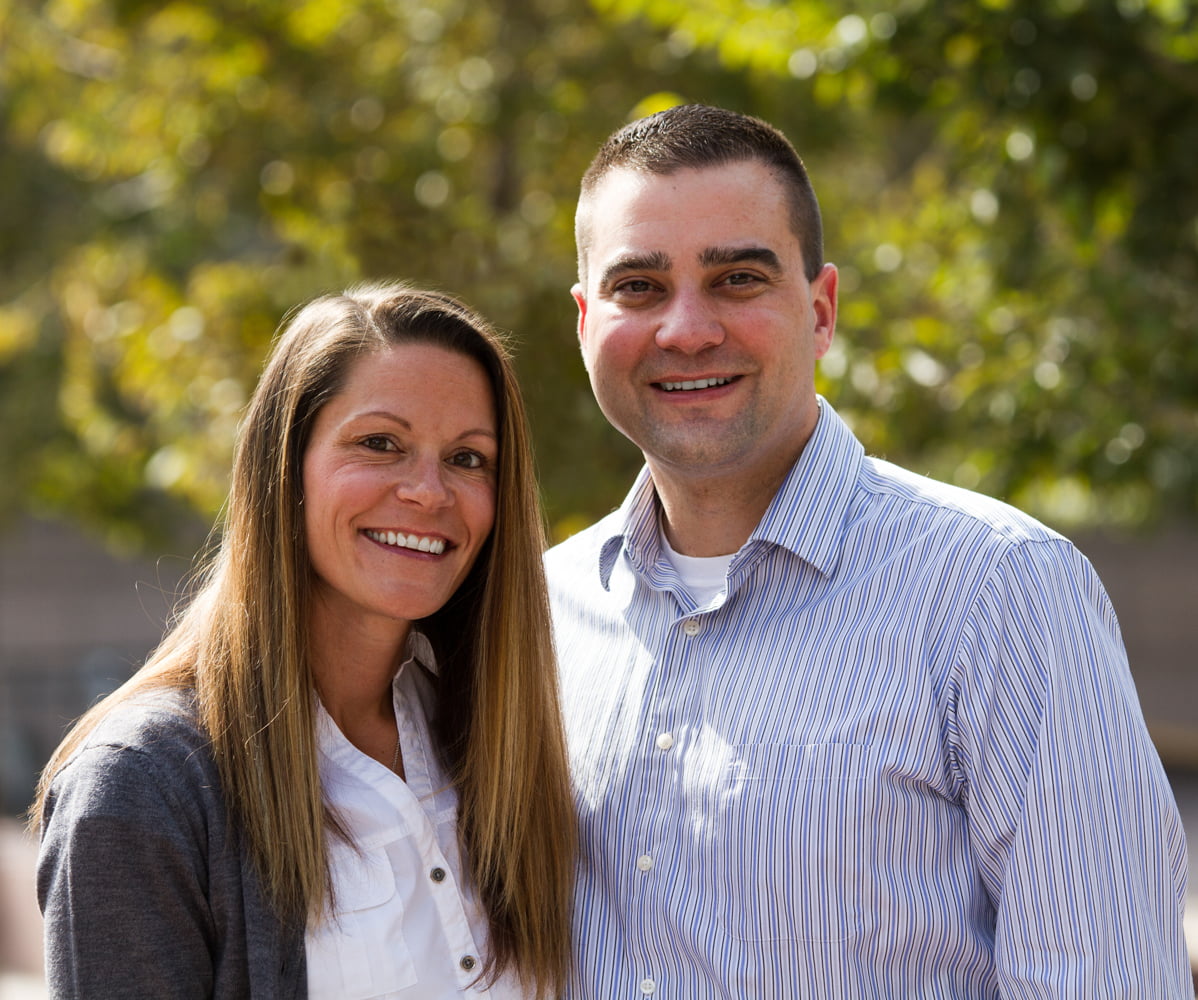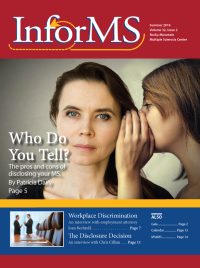In 2006, Chris Cillian was 29 years old and working to further her career as a communications and marketing professional in Denver, Colorado when she had her first MS exacerbation.
RMMSC’s Kerri Cechovic recently spoke with Chris to learn more about her experience with MS in the workplace – her decision to share her diagnosis with employers and co-workers, the challenges and benefits of disclosing her MS, and how things have changed over time.
InforMS: Chris, please tell us about when you were first diagnosed with MS.
 Chris: It was a pretty major attack—I could hardly walk. I knew there was something very wrong, but there wasn’t enough evidence to have an MS diagnosis. I was eventually diagnosed in 2008—about a year and a half later—based on a follow-up MRI.
Chris: It was a pretty major attack—I could hardly walk. I knew there was something very wrong, but there wasn’t enough evidence to have an MS diagnosis. I was eventually diagnosed in 2008—about a year and a half later—based on a follow-up MRI.
InforMS: What was your workplace situation at the time?
Chris: I’d been working at a company for several years when that first big attack put me out of work for about four months. When I recovered, I went back to work. And at the time they said I didn’t have MS. So I sort of thought, well I better just get on with my life and stop worrying about this stuff.
Of course, people knew there was something wrong. I’d been out on disability for four months. I had to explain to my supervisor that due to a medical problem, my doctor had ordered me off work.
Once I returned to my job, I was transferred to a different department with a new supervisor and co-workers. So it was easier to put the whole episode behind me.
InforMS: When you were finally diagnosed with MS, did you approach your employers about it?
Chris: My diagnosis came a long time after my first major attack. I wasn’t having any visible symptoms and it all seemed so unreal. I didn’t tell my employer at that time because I was kind of in shock.
I did tell a few people at work, so it wasn’t like I was afraid to talk about it. But people really reacted strongly! They were very compassionate, but also extremely upset for me. It was sort of scary because they seemed more upset than I was. So I stopped telling people for a while. It just seemed easier to keep it to myself.
A few months later, I was offered a job with a different company. But before I took the job, I had to find out if my MS therapy was covered by the medical plan. It was so frustrating. On one hand, I didn’t want to tell them about my MS because I thought it might make me a less desirable candidate, but on the other hand I couldn’t accept the offer until I knew whether the medication was covered.
I waited until I received a written job offer, and then I asked to talk with their HR department confidentially. We figured out that the drug was included on the formulary, so I took the job. I only told the HR representative about my MS at that time. After I started, I told my boss.
InforMS: What factors did you consider in your decision to tell your boss about your MS?
Chris: Well, part of my role was managing outdoor events in the summer. I thought the heat might become an issue, so I wanted to be proactive and explain how heat can affect people with MS. My boss was very supportive when I told her. She acted like it was no big deal. Her reaction was so different from people when I was first diagnosed. It made me feel a lot more comfortable telling others about my MS.
Another reason I told my boss was the way my first attack unfolded. For 2-3 weeks, I experienced these crazy episodes of full body seizures. If that were to happen at work it would be horribly frightening for everyone. I felt like my boss needed to know, just in case.
InforMS: How did your MS impact your work life?
Chris: After a few years, I started having some trouble concentrating, especially with interruptions and background noise. I sat in a cubicle, so I ended up asking for reasonable accommodations to help with my ability to focus and multi-task.
The company was great in terms of following the law to the tee. At the same time, I felt like I was on trial or something. The interview about how my disability affected my job felt very negative, but I knew it was a part of the process. Looking back, the negativity was probably more about feeling vulnerable because I was asking for accommodations. Maybe it made my MS a little more real.
Finding an acceptable solution was pretty frustrating. At first, they put a plastic door on my cubicle to cut down on noise.
It didn’t help. I need to be in a quieter place. I didn’t care if was in an office or a coat closet—just somewhere quiet so that I could do my job. It seemed like they made it harder, not easier, to get to that point. But eventually they did put me in an office (with a door), which worked great.
InforMS: How did you feel once those accommodations were made?
Chris: I felt really nervous. I wasn’t a manager so I didn’t “qualify” to have my own office. I felt like people might think I was getting special treatment. But, by that time most people knew I had MS. Still, I felt compelled to explain, “It isn’t that I’m getting special treatment—this is the solution human resources provided.”
The majority of my coworkers were very understanding, but some were not. I mean, I looked normal and I performed pretty normally, so why would a nonmanager like me need a private office?
Sadly, there will always be people who doubt a person’s MS symptoms. I was just happy to be able to get my work done!
InforMS: In the interview process for your next position, your decision to disclose unfolded in a somewhat unexpected way. Tell us how that played out.
Chris: Yes, I disclosed my diagnosis in the second interview for a job with a health care company. I was meeting with the CEO, who was also the former CEO of a hospital.
I was confident that I was well-suited for the job. And I felt like they thought I was a good candidate too, because they brought me back for the second interview. But during that interview, the CEO explained, “My concern is that you don’t have much experience with health care.” I said, “Well actually, I’m probably more experienced with health care than most people.”
And then I just laid it out: I told him that I have relapsing remitting MS.
As I said those words, I thought I might have shot myself in the foot. It was a gut reaction, the words popped out of my mouth before I could stop them. But, I’d been through so many health care providers and facilities and medications that I definitely knew the system. I felt my non-traditional health care experience was absolutely relevant. Luckily, he completely understood. He said, “I don’t care if you walk up and down the stairs or if you take the elevator because you’re in a wheelchair. We’re hiring you for your ability to do the job. And while it’s great that you’ve got health care experience—because you’ll need it to be successful here—your MS is not a factor to us.”
It felt awesome, because I was really taking a risk by disclosing my MS in the interview. I’m a very black and white person and I don’t really like to hide things. I knew people were going to find out if they offered me the job. So sharing my MS worked out really well in that case. My boss told me later that my disclosure distinguished me as the strongest candidate for the position.
InforMS: Eventually, you pursued a different path – independent communication and marketing consulting from home and then a parttime position. What was that experience like?
Chris: As a consultant, I feel a responsibility to tell my clients about my MS upfront, because I never know when I am going to have a rough day. Being open has allowed me to address deadlines and timing before they become issues, and has helped me make more personal connections with my clients. Most are happy to set timeline with a little bit of padding built in. And when I don’t need the extra time, I get projects done ahead of schedule, which makes my clients very happy! So consulting has worked out well for over 3 years now.
Recently, I decided I wanted to be back in an office environment. I missed interacting with people. But I’ve learned that I can’t do full-time work. I’ve tried every which way—working from home, cutting back a few hours—and it just is not possible.
So I decided to apply only for part-time marketing positions. I got called for an interview. The first question the hiring team asked was why I wanted a parttime job. I didn’t want to lie, and from my perspective I’ve got a very legitimate reason for seeking part-time employment.
So I just told her straight up, “I have a medical condition and it takes a lot to deal with it. As a result, I’m only able to work part-time. So this is actually an ideal job for me.” I hoped to differentiate myself from other candidates by giving a compelling reason for wanting the job. The hiring team seemed empathetic, so I felt good. Then they asked if I had any other questions. I said, “Yes. If it’s between me and another candidate, and the other person has nothing else that sets them apart, why wouldn’t you give somebody like me a chance? I want to work and be productive, but I need someone to give me that opportunity.”
I got the job and it’s been great. I feel very positive about telling my employer upfront. I think that disclosing my MS helped in the selection process. It allowed me to make a personal connection with the hiring team.
InforMS: What would you tell someone who is thinking through how to handle their MS in the workplace?
Chris: The decision to disclose is a very individual one. Every situation is different. If you are disclosing your MS before you are hired, make sure the information will be well received. Disclosure makes a lot more sense if there’s a specific reason for sharing your diagnosis. My decisions were spur-of-the- moment, gut reactions to specific situations and questions. While the risks I took paid off, things definitely could have gone another way.
I’ve also had a great support system, which has been critical. My husband, Brad, has been incredible in helping me find my way. I’ve had people around me to bounce ideas off of and talk through different scenarios. I feel grateful to have this powerful team of support to help me navigate through this process.
The bottom line is, even after all these years MS is still a pretty sensitive thing for me. It doesn’t ever go away and it does change your life, so finding ways to keep things as normal as possible is really helpful. For me, “normal” is continuing to work in any capacity I can.


